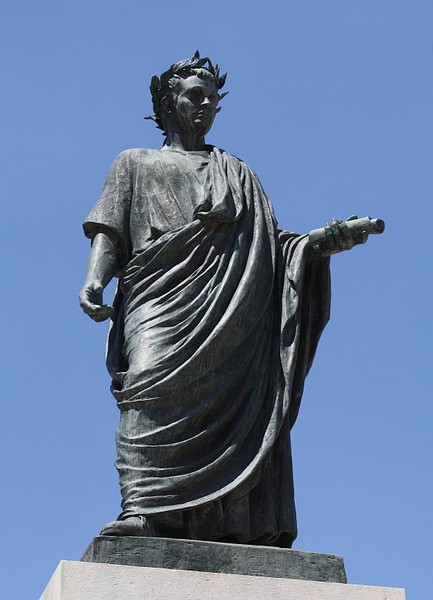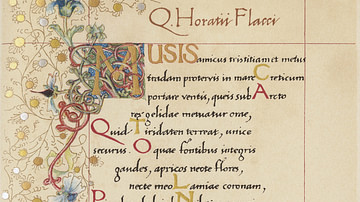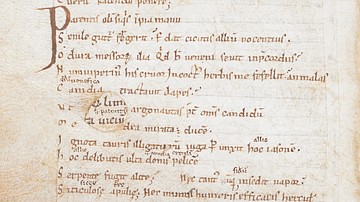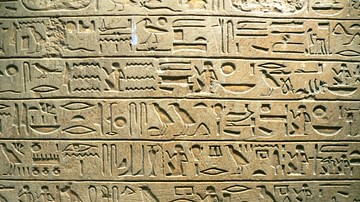Horace's Epodes is a book of 17 poems, published around 30-29 BCE. It contains many of the earliest poems of Quintus Horatius Flaccus, better known as Horace (65-8 BCE); some were written before his acquaintance with Maecenas, patron of the arts.
Horace
Quintus Horatius Flaccus was born on 8 December 65 BCE in the town of Venusia, located in the Italian province of Apulia. His father was a successful public auctioneer and a freedman, supposedly enslaved when Venusia was captured by Roman forces during the Social War of 91-87 bce. Despite his father's status as a freedman, Horace was able to attend the highly-regarded school of Orbilius in Rome and later study in Athens alongside the sons of the Roman elite. Regardless of his own personal success, Horace was never ashamed of his father and never apologized to anyone about being the son of a freeman.
While in Athens, he became acquainted with Marcus Junius Brutus (85-42 BCE), one of the assassins of Julius Caesar (100-44 BCE). As a military tribune, he fought with Brutus throughout Greece and on the losing side at the Battle of Philippi, a disastrous defeat at the hands of Mark Antony (83-30 BCE and a young Octavian, the future Roman emperor Augustus (r. 27 BCE to 14 CE). Upon returning to Rome, he learned that he had lost his father's estate in the land confiscations of 41-40 BCE. This left Horace with a bitter taste for Roman warfare. Penniless, he turned to his love of poetry to earn a living. Fortunately, he was able to procure (or purchase) the position of clerk to a quaestor.
Around 38 BCE, through his acquaintance with the poets Virgil (70-21 BCE), author of the Aeneid, and Varius Rufus (74-14 BCE), he was introduced to Gaius Maecenas, a patron of arts, who invited Horace to join his inner circle of young poets. Maecenas would, one day, give Horace a farm on the Sabine Hills outside Rome, which Horace would use as a sanctuary away from city life. Throughout his verses and letters, he made numerous references to his love of the country and disdain for the city.
Through Maecenas, Horace met the emperor. Impressed with the poet, Augustus invited him to join the imperial staff, but Horace refused. However, he would accept an invitation in 17 BCE to write the Carmen Seculares, a secular hymn sung by a mixed choir of boys and girls, to celebrate the Ludi seculares, the Secular Games. Horace's career as a poet spanned over 30 years, during which he wrote his Satires, Epistles, Epodes, Odes, and the Ars Poetica.
Epodes
Unlike Horace's Epistles and his Satires, the Epodes is just one book of 17 poems, published around 30-29 BCE; some of the poems were written before his acquaintance with Maecenas. Translator and author Stephen Harrison writes that the Epodes "takes on the rumbustious world of Greek imbus, poetry of crude aggression and comradeship." (9) Throughout his poetry Horace cautions his readers to avoid the stress and excess of their hectic lives – a possible influence from his time studying Greek philosophy in Athens. In keeping with the Epicurean philosophy, Horace's poems demonstrate a joy for life and a love of nature.
However, the transition from Roman Republic to Roman Empire had an effect on Horace's early works. In the opening poem of the Epodes, Horace speaks frankly to Maecenas who was about to leave Rome with Octavian and "to undergo any of Caesar's dangers." He was probably referring to the Battle of Actium against Mark Antony and Cleopatra. He was concerned for Maecenas' safety (and his own sanity): "What shall I do? To whom life may be agreeable, if you survive; but, if otherwise, burdensome." (Epodes, I) Luckily for both, Maecenas returned safely. Horace asked, "O happy Maecenas, shall I, overjoyed at Caesar's being victorious, drink with you under the stately dome." (Epodes, IX) There were veiled references in the poem to both Cleopatra and Mark Antony: "the Neptunian admiral, driven from the sea, and his navy burned, fled ... enslaved to a woman, carry palisades and arms" (IX) In another reference to Antony Horace wrote: "Our enemy, overthrown both land and sea, has changed his purple vestments for mourning" (IX) – a possible reference to the death of Cleopatra.
Horace was also concerned about the attitudes of his fellow Romans concerning the warfare:
... why are the swords drawn that were so lately sheathed? Is there too little of Roman blood spilled upon land and sea? .. .Does blind frenzy or your supreme valor ... hurry you on at this rate? (VII)
He wrote that, while Rome had not fallen to the Gauls or to Spartacus, "we, an impious race, whose blood is devoted to perdition, shall destroy her, and this land shall again be possessed by wild beasts" (XVI).
Escape for Horace from life in the city was to go to the country:
Happy the man who, remote from business, ..., disengaged from every kind of usury ... shuns both the bar and the proud portals of citizens in power. ... it pleases one to see the well-fed sheep hastening home! to see the weary oxen, with drooping neck, dragging the inverted ploughshare! (II)
Oddly, this speech did not come from Horace but from the usurer Alfius:
When Alfius, the usurer, now on the point of turning countryman, had said this, he collected in all his money on the Ides; and endeavors to put it out again at the Calends. (II)
Several of his odes are verbal assaults and demonstrate some good examples of Horace's unique ability to turn a phrase. Although Horace was the son of a freeman, he takes a different approach with Menas. He reprimands Menas:
... you that are galled at your back with Spanish cords, and on your legs with the hard fetter. Menas was a former slave but was now serves as a military tribune Though, purse-proud with your riches, you strut along, yet fortune does not alter your birth. (IV).
In another poem, Horace labels Cassius Severus as a coward, although he never mentions exactly what the man has done: "Why doesn't thou not, if you can, turn your empty yelpings hither, and attack me, who will bite again" (VI) And to the loathsome Maevius, Horace hopes the ship that carries him away makes its departure under an unlucky omen: "May the gloomy east, turning up the sea, disperse its cables and broken oars." (X) Lastly, he castigates an elderly woman for trying to look young. Her color appears "as if stained with crocodile's ordure (excrement)" and "how rank an odor every where rise from her withered limbs" (XII)

In three different poems, Horace speaks of Canidia with a head of vipers (reminiscent of Medusa). She was one of a group of witches who had captured a young boy who was unable to resist them and escape. When he can no longer fend off Canidia and the other witches, he says:
"... when doomed to death I shall have expired, I will attend you as a nocturnal fury and a ghost. ... The mob, from village to village, assaulting you on every side with stones, shall demolish you filthy hags." (V)
In the final two odes of the Epodes, Horace revisits the witch Canidia. Although not entirely clear why; he has apparently spoken ill of her and she has responded with rage, wishing evil upon him. He pleads with her to desist her assaults; he has suffered enough on her account: "... my vigor is gone away. ... I will with honor pay the demanded mulct; ready to make an expiation" (XVII). She responds, "An irksome life shall be protracted by you, wretch that you are." She hopes he will suffer tortures equal to Tantalus, Sisyphus, and Prometheus. With Horace pleading to end the tortures, she says she "will ride your odious shoulders, and the whole earth shall acknowledge my unexampled powers" (XVII)
Conclusion
Although published much later, many of the Epodes are among Horace's earlier works. According to Edith Hamilton in her The Roman Way, his early writings have a "bitterness even brutality" – something that would eventually pass. She believed that "Words and phrases were his passion" (123). He was part of a golden age of Roman literature that would end with the death of Augustus. In the words of historian Nigel Rodgers, Virgil, Horace, and the banished poet Ovid created a classical style that many believed was comparable to that of the ancient Greeks.








